My Life with DID
TW// This blog will mention topics that touch on mental health, mental illness, eating disorder, depression, suicidal ideation, body image
Hi y'all, It's Cowbo - The following was written by a different alter and then revised/edited by a different alter from that one. I am providing the space and platform to spread awareness and educate others via our experience with DID : You may be reading this because you want to know about dissociative identity disorder and my experience, or you are curious, or you know of someone who deals with this disorder themselves and you want to be able to understand and be more supportive. I hope you read through this fully and ask me any questions you may have - I'm more than happy to help educate more on this disorder since it is so negatively portrayed and not as commonly known as other disorders. Finding the right type of help for this disorder can also be difficult.
- What is DID?
- How does one end up with DID?
- How does one get diagnosed ?
- When did you find out you have DID? Did you always know?
- How was it found?
- How many people are there?
- Dissociation?
- Is it like... all of a sudden you "come to"?
- Are you all different “personalities/people” or the same?
- Jane Smith
- Mapping
- Who is writing this?
- Is switching like getting really wasted blackout drunk?
- What’s the end goal in therapy for DID?
- How do you identify with all these alters?
- Do you have an inner world/headspace?
- What does it feel like to be a different age than your other alters?
- What’s it like to be in the co-conscious?
What is DID?
DID was previously called Multiple Personality Disorder. People most commonly think of the movie split when they hear of this disorder - but that movie negatively portrays this disorder. DID is a severe form of dissociation - structural dissociation - in which there are many disconnects between ones self and their thoughts, identity, consciousness and memory. There are barriers keeping different parts/alters separated - each for their own reasons. Dissociation here is used as a coping mechanism.
How does one end up with DID?
DID happens when there is overwhelming events or prolonged abuse/neglect (whether physical, emotional, environmental, etc) in childhood (typically before the age of 6 or 9). That time in childhood is a very important and sensitive developmental time where one’s self is becoming integrated. If that time is disrupted by childhood trauma, the self is not fully integrated and is kept in parts.
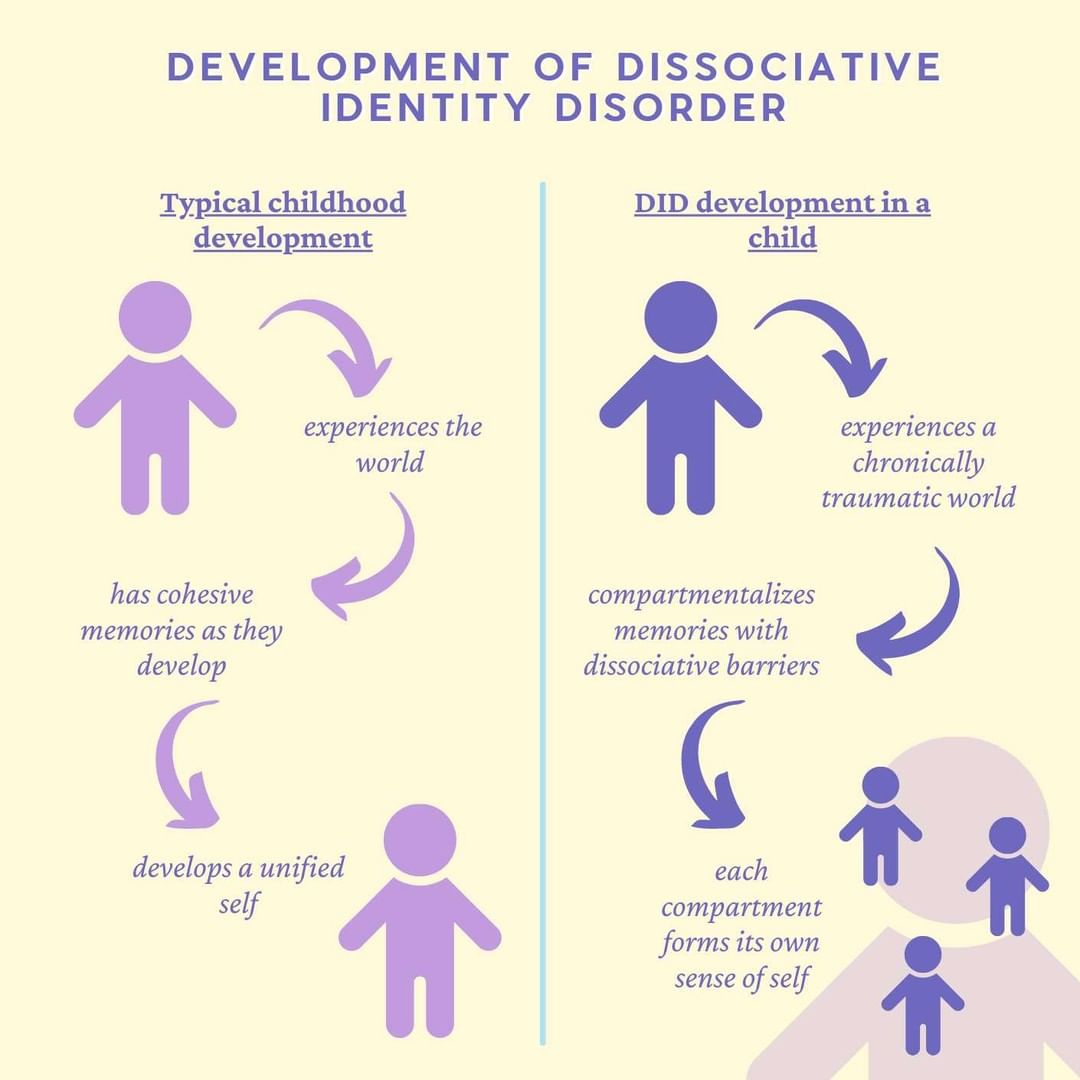
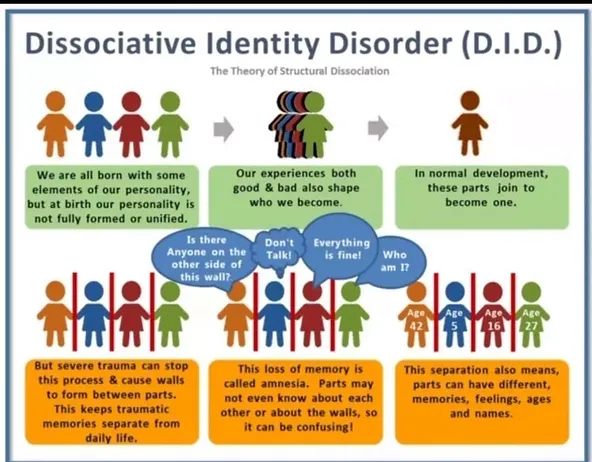
These parts are kept separated for survival. When you are a child, dissociation happens when you cannot physically or emotionally fend for yourself, so you leave mentally and create these amnesiac barriers that put the traumatic memories away.
How does one get diagnosed ?
I’m not an expert or psychologist, so I’ll keep this simple with a copy paste - According to the DSM, these are the criteria that must be met: Disruption of identity characterized by two or more distinct personality states, which may be described in some cultures as an experience of possession. The disruption of marked discontinuity in sense of self and sense of agency, accompanied by related alterations in affect, behavior, consciousness, memory, perception, cognition, and/or sensory-motor functioning. These signs and symptoms may be observed by others or reported by the individual. Recurrent gaps in the recall of everyday events, important personal information, and/or traumatic events that are inconsistent with ordinary forgetting. The symptoms cause clinically significant distress or impairment in social, occupational, or other important areas of functioning. The disturbance is not a normal part of a broadly accepted cultural or religious practice. Note: In children, the symptoms are not better explained by imaginary playmates or other fantasy play. The symptoms are not attributable to the physiological effects of a substance (e.g., blackouts or chaotic behavior during alcohol intoxication) or another medical condition (e.g., complex partial seizures).When did you find out you have DID? Did you always know?
I found out in 2021. I was in my early 20s. I grew up not knowing I had this disorder, just knew I for sure had anxiety and depression - and suspected I had PTSD from my childhood (this part is important) and from a negative experience with relationships. I did not know I had DID until I was diagnosed that year. Growing up I did have trouble with my memory and would hear voices in my head. I could sometimes see who that voice came from. I could see the headspace and entities in the headspace. None of this was my choice to imagine. When I was very young and would inquire adults about the voices, they would just tell me it's my conscience or my train of thought. Even so young, I knew this was not true because sometimes those voices would say things I wasn't even thinking about or things I would not agree with. Sometimes we were not even on the same page on decisions. As a child though, I was too afraid to disagree with adults - they know more than I do right!? So I kept all this to myself and just agreed with the adults.How was it found?
I did not go to therapy until I left home and was attending college - even then it wasn't consistent. Actually, it was not a great experience...it was hard to get an appointment and the first two therapist I saw, I just felt like I was not getting help. One time I was actually suicidal and went to the office asking to see anyone - I was sobbing and ready to just end everything - and I was told nothing was available for TWO WEEKS. I don't remember what happened after that but I'm here! After those two therapist, I saw a psychologist who confirmed I was dealing with anxiety and depression. She was a lot more helpful and gave me some information that would help me when I got panic attacks. It did not completely solve my panic attacks or lessen how many I got, but I was able to better manage them and they were slightly less scary once I knew what they were (I did not know that the thing I was experiencing was panic attacks). Once I graduated, I could no longer go to the same people I was seeing for therapy. Depression got really bad but I had a support system that really helped me through it all. Eventually, it got so bad that even my support system could not help - so they encouraged me to seek help. At first I was hesitant because I felt like all this would never end, but I did go to get help. I saw a psychologist. I felt like they were not listening to me or really understanding me - but they did tell me something that really has stuck with me. Pretty much, my depression was so bad, that even they could not help me unless I took medication. I had never taken medication before and was afraid to take it. The psychologist explained it like this:Right now your depression has you stuck inside a house and you feel like you can't breathe unless you open up a window - but the windows are stuck shut and you can't open them. Medication is gonna be that tool that helps you crack open that window so you can finally pry open those windows and breathe again.Something along those lines. Anyway - those lines are what got me to see a doctor. Again, I was aa low point again, contemplating suicide. My doctor had so much empathy and was so caring and understanding and heard me out as I was in tears. He listened to my worry about taking medication - because yes, I was afraid to take it. This doctor eased that worry and started me off on Bupropion (aka Wellbutrin). It helped but I think I had an allergic reaction to it, so I was later changed to Escitalopram (aka Lexapro). This really helped me a lot! I finally was able to get out of bed instead of sleeping my days away and I finally could really follow through on any help I received. Although I could stay awake longer and could actually partake in the help I was seeking, there was one more thing I had to do. I needed someone new to see for psychological help. Next thing you know, Covid happened and therapy was moved to telehealth. My anxiety was really bad at this point in time. I would have anxiety attacks on calls and meetings, even in the drive thru. I did not wanna do telehealth...I ghosted my psychologist. Eventually, through some program my job offered, I decided to seek help with a psychiatrist and therapist. OMG - the new psychiatrist and therapist I was seeing were amazing! This is where things start improving. My psychiatrist added Venlafaxine (aka Effexor XR) to my medicine menu with the Escitalopram. And my therapist - well - they were great but we were going in circles. You see, my therapist at the time heard me out on my depression and anxiety and my worry of going in circles with therapy. Though they have experience with depression and anxiety they realized that there was another issue at hand that was leading to those symptoms of depression and anxiety. They suspected I was dealing with DID and explained the following to me:
I work with those who have depression and anxiety - and I am not licensed to diagnose you but I think you may have dissociative identity disorder. I am not licensed nor knowledgeable enough to provide help for DID. Think of it this way - Let's say you hurt your leg real bad. You've got cuts and scrapes but also have a broken bone. You come to me as a doctor and bandage you up, stop the bleeding, that stuff... does that fix everything? No! The cuts and scrapes are a symptom of your hurt leg but I am not a surgeon/specialist who can fix broken bones - you need to see someone qualified to fix broken bones. This is where we are - I can help you with the depression and anxiety, but those are just symptoms of the bigger issue. Until that broken bone (or in this case, the DID) is addressed, you are going to continue having issues and hurting.That therapist helped me find a DID specialist who is now helping me through this! As for the signs this therapist noticed: There was the initial depression and anxiety which we were focusing on in our therapy together, but he also noticed PTSD, lots of dealing with childhood trauma, forgetfulness, voices in my head that I explained are not just voices but full entities and I could explain how they looked and I could explain how my headspace looked, the feeling of floating just outside my head or feeling like I'm shrinking but my physical body stays the same (if that makes any sense), losing sight without medical explanation, and fainting without medical explanation. By 'without medical explanation', I mean that it was investigated by doctors and labs, etc - and nothing was found. Other things we collected were my handwriting and videos of myself that all varied in some way (change in attitude/manner/speaking and change in handwriting). These signs pointed toward a greater core issue than depression and anxiety and that therapist suspected the source was DID. I reached out to some of the DID specialist I got referred to and the first one I was able to meet with is the one I am still with today. The DID specialist I'm seeing now did intake and had me take some test or questionnaire of some kind which further concluded I was dealing with DID. Now here I am!
How many people are there?
Technically, we are all the same person but also separate - DID can sometimes be complicated to explain. Growing up I had 9 alters At the time of editing this (5/22/23) there are 15 of us total. Over time with therapy, we are able to better identify some alters who may seem alike but are separate entities. Some might become active again after being dormant for so long. Not everyone is the same age, Not everyone is the same gender, and most of them actually don't have names. Only a few of my alters have names. Not everyone comes out either - some of the alters stay in the headspace and some actually come out. Right now, I cannot tell who is out when. This is something we are trying to address in therapy.What’s dissociation?
“Disconnection and lack of continuity between thoughts, memories, surroundings, actions, and identity.”Do you understand that? If not, don’t worry! I’ve learned a lot of what I know now through analogies so I’ll use one here. Think of it like this - Have you ever been on a drive and you start driving to wherever you are going…then all of the sudden, your at your destination. But you can’t recall your drive. "How long have you been driving?" What did you pass? OMG, did you stop at the red lights and stop signs!? You likely did (I hope), but you can’t recall any of this information. You just know that you left, got in the car and started driving. Next thing you know, you arrived at point B. That’s what my life is like but not just with driving. It's my days, my weeks, any calls I have, any events I go to. I can’t recall work once my work alters leave - so I’m constantly playing detective trying to catch up and find out what was done. That’s dissociation.
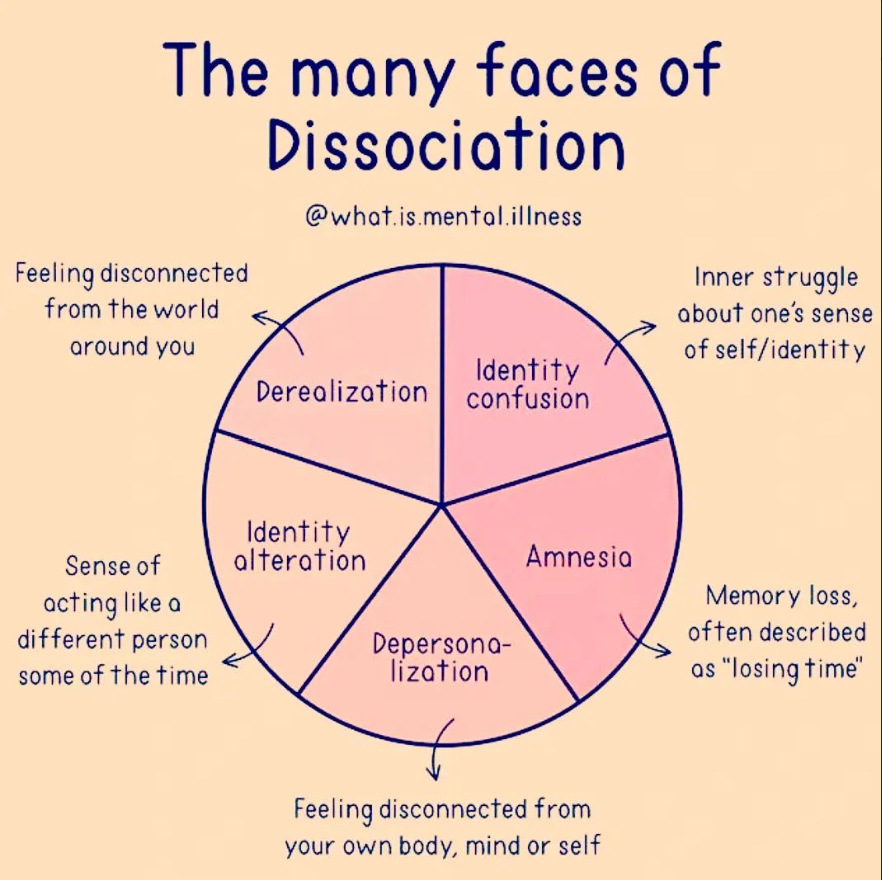
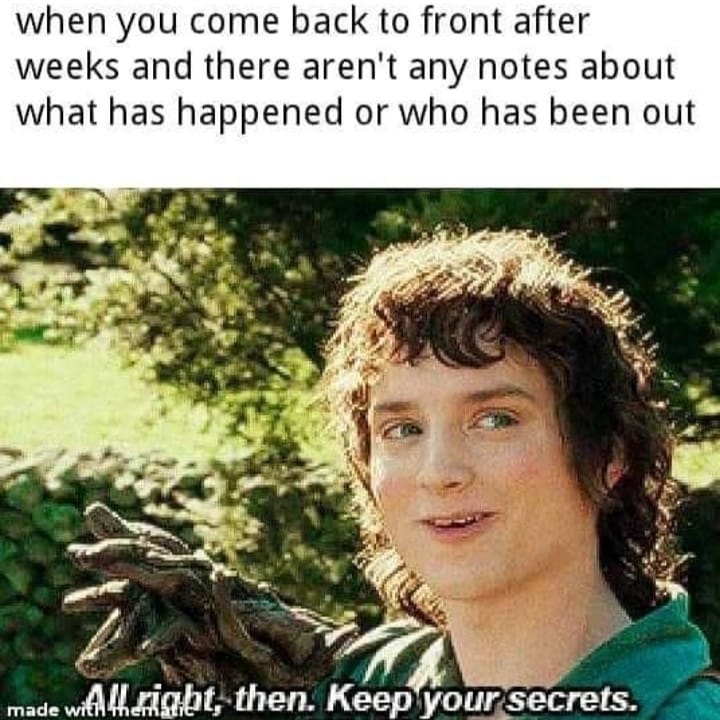
Is it like... all of a sudden you "come to" and realize you just spent the past X minutes/hours being one of your other selves, and now you're being someone else?
For the most part - for me - It is not sudden. It’s more like the ‘Dissociation’ example I gave of when you are driving and forget you are driving. You’re just kinda like ‘oh shit! I’ve been driving this whole time!' But you don't hit the brakes right then and there and try to figure out what you’ve passed and how long you’ve been driving. You kinda just wave it off and continue along your way. That’s what I’ve done all my life - we just wave off that realization and just continue whatever it is we found ourselves doing. It isn’t until later when we try to recall our day that we realize “oh shit, I guess we must’ve switched at that time because I can’t remember what we did before ___” . For me, I feel it is a lot more noticeable in adulthood because we have 'adult responsibilities' we have to actually take care of , like a job for example. Additionally, it usually is not as obvious as media makes it seem - this is because the alters, for the most part (this can vary from person to person who has DID) , will attempt to come off as the main host. For me, my DID is very covert and most people who meet me don't notice it. It's only noticeable when I get comfortable around you and you've known me for a long time and you start noticing the slight differences.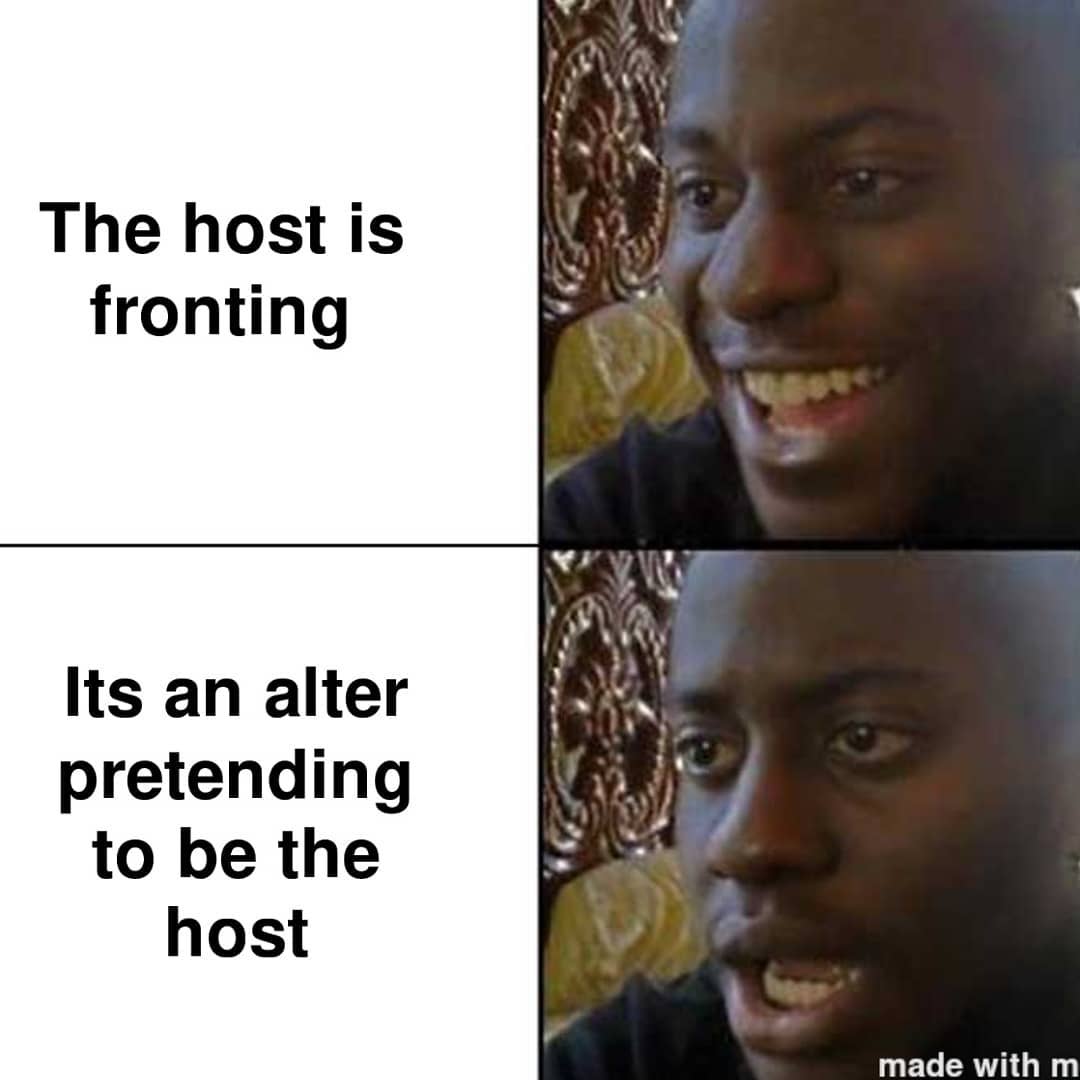
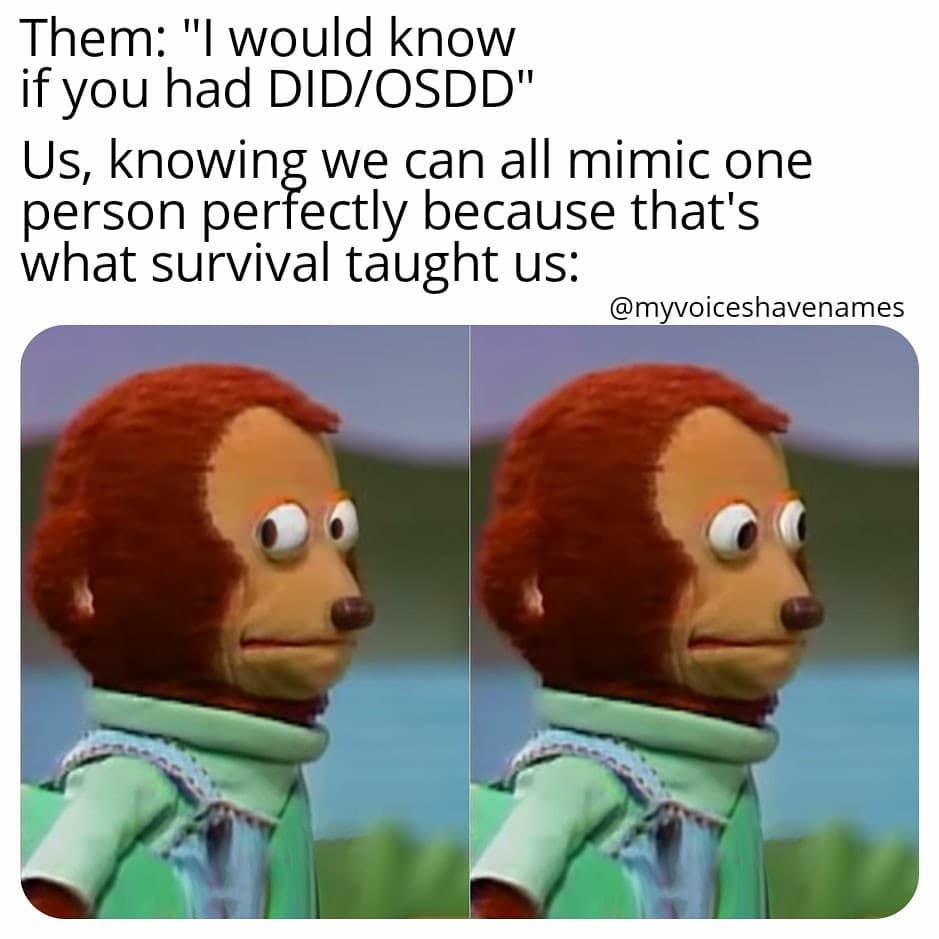
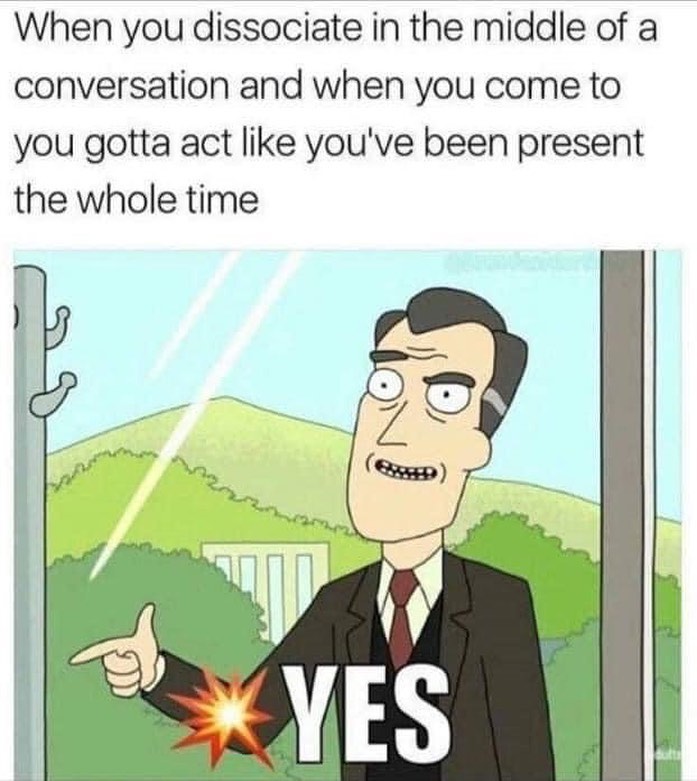 I have had switches where it is sudden and surprising. There’s been times when I’m home, maybe cleaning, maybe cooking, whatever - and then all of the sudden, I find myself at the store! I don’t remember leaving home, driving, or why I’m even at the store. Times like those are shocking and scary.
Then there’s times when all of the sudden, a work alter decides to put me in front of the work and leave. I would describe it to you like if maybe you were zoning out and then all of the sudden someone claps in front of you and you did not even realize they were there. I’ve had this happen before and was surprised to find myself in front of monitors with work things.
I have had switches where it is sudden and surprising. There’s been times when I’m home, maybe cleaning, maybe cooking, whatever - and then all of the sudden, I find myself at the store! I don’t remember leaving home, driving, or why I’m even at the store. Times like those are shocking and scary.
Then there’s times when all of the sudden, a work alter decides to put me in front of the work and leave. I would describe it to you like if maybe you were zoning out and then all of the sudden someone claps in front of you and you did not even realize they were there. I’ve had this happen before and was surprised to find myself in front of monitors with work things.
Are you all different “personalities/people” or the same? I’m confused…
That’s kinda the whole confusing part of DID - yes we are different ‘entities’ but we are all the same person. We should have all integrated together in childhood to create our own self - but instead, we stayed separated. I like to describe it like an orange. Those without DID are like a whole orange. Fully integrated. Those with DID are also a whole orange, but the orange is out in slices instead of whole. Each slice is a part of that whole orange, of the same orange, but they also exist as their own individual slice.
Mapping
I have a total of 15 alters - though I’m still personally having trouble accepting that lol A common thing done in work for DID is an exercise called mapping. Depending on who you work with, the process can look different but all have the same idea. For me, I began this exercise with making sketches of my alters. Below is the sketch I made of some of them: After these sketches, my therapy work focused on learning more on each part - What are each part’s likes and dislikes? Is there any conflict among them? Who gets along with who? Who knows the most? Who is ‘out’ the most? Who is talkative and who is a loner? What are their ages, names, and skills? Who is aware of who?
Most of this information is kept in a journal in which we try to write in daily (but we all fail to haha). We’re supposed to write in it daily so that we can look back and see what we did instead of digging for the information. It can also help us find patterns so we can figure out who is who/who comes out.
I’ve found an app that helps us do this mapping, create polls for all the alters to vote on, create notes for each other, and track our time ‘out’. The app even allows me to add friends so that they can be notified when someone new is out - but that’s only if we actually go into the app and note it. We’re still working on getting better at tracking stuff. It will definitely take some practice and routine! The app's name is Simply Plural.
Mapping helps us work towards establishing a good foundation so we can build communication among everyone. Right now, everyone is not sharing everything which is why there are so many gaps in my memory and why I lose so much time. If we can communicate better, we would have smoother days and would be able to share information instead of having to play detective and catch up to figure out what we’ve done.
Jane Smith
*Name have been changed for my own safety
The 'Janes' are my work alters. They are the only ones who have confirmed names - they also are the ones who are less aware of everyone else since their ‘purpose for existing’ is for work. This is because they are kept away from all the trauma associated parts so that they can function. It’s like if two slices of orange were put aside and those slices were not aware there there were other slices. Additionally, these two slices think they are each a whole orange.
But one slice doesn't make an orange.
The 'Janes' also existed in my college time to get through college - which is why I struggle remembering my time in college and am also surprised when I see pictures of myself in college! Up in my mapping drawing, the 'Janes' are the two standing next to each other, one is in a dress and one is in pants.
I believe the one who was out the most during college was likely the one in the dress. As far as I know, I only wear black - maybe sometimes gray. I also would describe myself as an introvert and not really a person to go to events…but man, 'Jane' in college was in so many groups and involved in so many events! And look at the color in those outfits!
After these sketches, my therapy work focused on learning more on each part - What are each part’s likes and dislikes? Is there any conflict among them? Who gets along with who? Who knows the most? Who is ‘out’ the most? Who is talkative and who is a loner? What are their ages, names, and skills? Who is aware of who?
Most of this information is kept in a journal in which we try to write in daily (but we all fail to haha). We’re supposed to write in it daily so that we can look back and see what we did instead of digging for the information. It can also help us find patterns so we can figure out who is who/who comes out.
I’ve found an app that helps us do this mapping, create polls for all the alters to vote on, create notes for each other, and track our time ‘out’. The app even allows me to add friends so that they can be notified when someone new is out - but that’s only if we actually go into the app and note it. We’re still working on getting better at tracking stuff. It will definitely take some practice and routine! The app's name is Simply Plural.
Mapping helps us work towards establishing a good foundation so we can build communication among everyone. Right now, everyone is not sharing everything which is why there are so many gaps in my memory and why I lose so much time. If we can communicate better, we would have smoother days and would be able to share information instead of having to play detective and catch up to figure out what we’ve done.
Jane Smith
*Name have been changed for my own safety
The 'Janes' are my work alters. They are the only ones who have confirmed names - they also are the ones who are less aware of everyone else since their ‘purpose for existing’ is for work. This is because they are kept away from all the trauma associated parts so that they can function. It’s like if two slices of orange were put aside and those slices were not aware there there were other slices. Additionally, these two slices think they are each a whole orange.
But one slice doesn't make an orange.
The 'Janes' also existed in my college time to get through college - which is why I struggle remembering my time in college and am also surprised when I see pictures of myself in college! Up in my mapping drawing, the 'Janes' are the two standing next to each other, one is in a dress and one is in pants.
I believe the one who was out the most during college was likely the one in the dress. As far as I know, I only wear black - maybe sometimes gray. I also would describe myself as an introvert and not really a person to go to events…but man, 'Jane' in college was in so many groups and involved in so many events! And look at the color in those outfits!
.jpeg)
.jpeg)
.jpeg)
.jpeg)
.jpeg)
.jpeg)
.jpeg)
.jpeg)
.jpeg) I guess she doesn't really smile in pictures either?
If I were to go into detail on each alter, I’d probably have a very long post for each one.
I guess she doesn't really smile in pictures either?
If I were to go into detail on each alter, I’d probably have a very long post for each one.
Who is writing this?
*Name have been changed for my own safety There’s a bit of two people writing these blogs A main author and co-author I guess. They don't feel they have names but they've both accepted to be called/go by 'Mary'. People usually can’t tell them apart at first interaction. Heck, it’s hard for us to tell us apart sometimes as well. This is something we are learning to identify in therapy - who is out when, what the patterns are for when they come out, who ARE they exactly… etc. One 'Mary' is the one who goes to therapy everytime. It’s something that stood out to both my current therapist and the therapist who identified that I needed a specialist in DID. They noticed that it was ALWAYS the same person in the chair - so how did they know there was DID at play if the same person always showed up? Well, that 'Mary' did not know what was happening in the day to day. They merely appear as a messenger. They notice things written or done by whoever is running the show in the day, and report it to the therapist. They relay any info from the therapist to the other alters. They tend to not have any preferences on things. A common reply given is that ‘they are indifferent’ to whatever is being asked. Things that are asked pertaining to feelings that you would think would provoke a response of sadness or anger or excitement, just come across as information to 'Mary'. “I’m a notetaker so whatever is supposed to provoke a feeling doesn’t apply to me. It’s just an ‘ok’ response. ‘Am I supposed to react’?” According to my therapist, the term applied to this part is the ANP or “apparently normal part.” An ANP is meant to handle daily life and appear as ‘normal’ as possible. ANP’s have limited emotional range. They are high functioning and can handle social interaction. The other 'Mary' is a lot more emotional and holds some traumatic information. This 'Mary is definitely not great at social interaction. They are anxious, cautious, and shy. They try to follow instructions/directions EXACTLY as given - otherwise, they panic or cry. This 'Mary' is likely the host of the system. The host being the most prominent part/personality/alter in DID. A System being the collection of alters.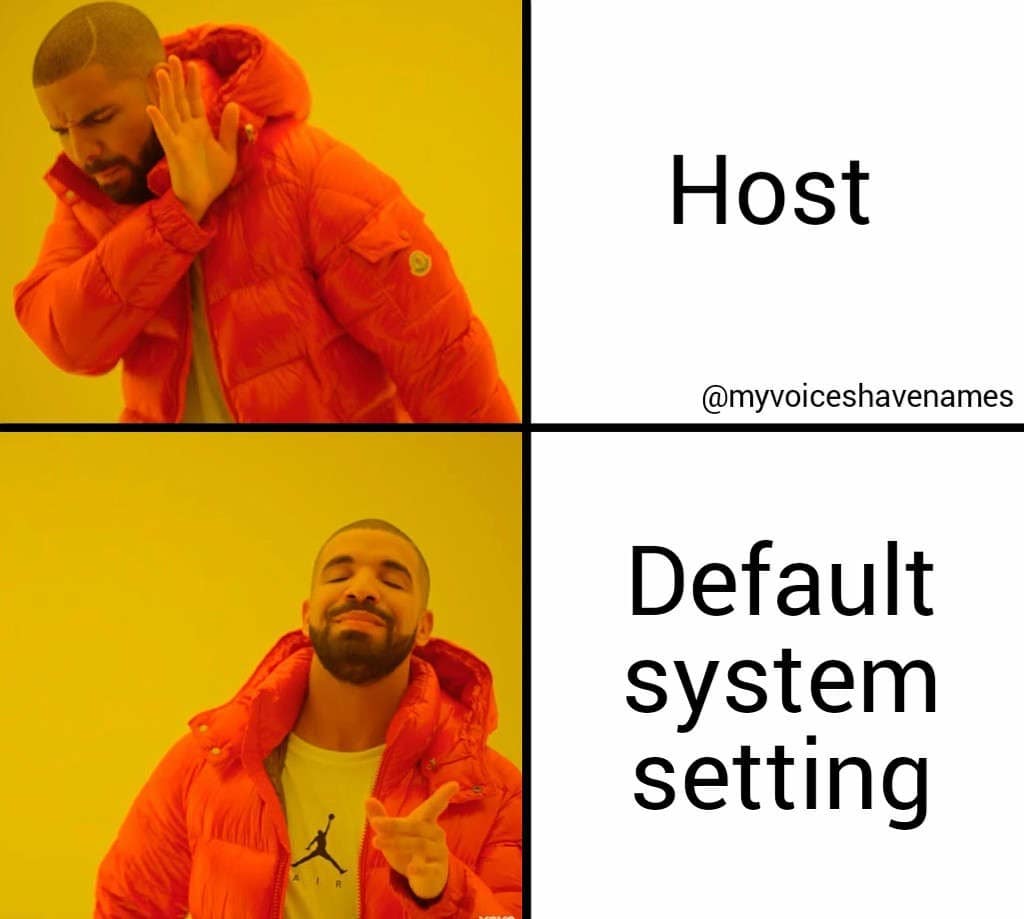
Is switching like getting really wasted blackout drunk?
I've had people ask this and I think it's funny people ask this because it’s the analogy I’ve used before to describe it to those who don't experience DID - besides the highway hypnosis example. This is coming personally from me and shouldn’t be used as a way to represent the whole of those who experience DID or are academics in psychology since the amount of dissociation can vary from person to person. I’ve explained that how sometimes - when people get really drunk, they will do things that they don’t remember. Maybe you partied too hard and your drunk self called an ex, traveled somewhere, bought something, etc - and the next day, you find those calls/txt, the thing you bought, or you find yourself somewhere new! You find you don't remember doing any of this and don't recall any details. Some of my switches are like that. I’ll find myself somewhere new or find messages I don’t remember ever sending. I’ll be wearing a different outfit or get told that I told someone information that I don’t ever remember saying. Sometimes, I don’t even remember having ever spoke to that person! Those switches are a lot scarier to me than the switches where information is shared among the alters or someone is co-conscious with me. It’s like playing someone else’s saved game and knowing nothing about the game.What’s the end goal in therapy for DID?
The goal is to fully integrate the alters together OR to build awareness and cooperation among all the alters."At the most basic level, integration simply means acceptance/ownership of all thoughts, feelings, fears, beliefs, experiences and memories (often labeled as personalities) as me/mine. It means giving up the split(s) that says something is ‘not me.’"I'm personally aiming to just have everyone cooperate and communicate better since we've lived like this all our lives. But our lives are still affected negatively because of the disconnect between each other. You use we, and I, and she, and they….How do you identify with all these alters? Big picture wise - I use She/They pronouns - the 'they' because there is many of us in this one body. You can’t offend or go wrong with these. Individually, we each have our own pronouns, but we don’t mind it if you use she or they for any of us. There is even a few guy alters who go by He/They pronouns but are understanding of the situation we’re all in - so they are indifferent if someone uses she. And as a fellow southern gal, y’all always works!
Do you have an inner world/headspace? What does it look like?
Yep, I do! Right now, it’s a lot of pink squishy walls that are curved. There is a hall. There are Super tall wooden doors - the tops are rounded. I can’t open any of the doors. And though this is all in what I want to say is my imagination, I never chose to imagine this space. The space has always just existed. I can’t create or destroy anything in this space. TBH, I feel like it’s based off the Spongebob brain office: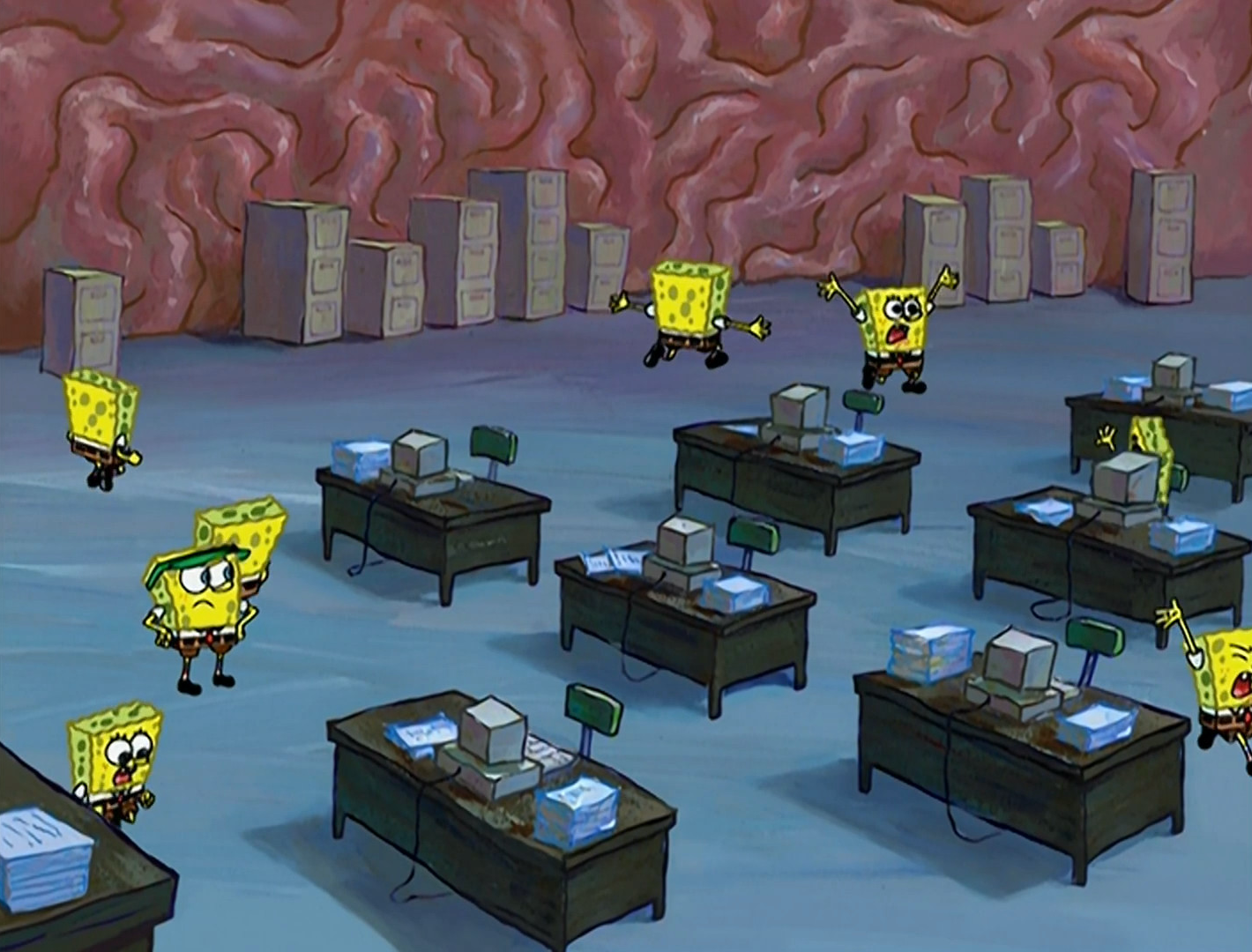 There is a place in the center I call the atrium which has a wooden coffee table, a green victorian couch and two other green matching chairs. In the back, long skinny table with drawers and a blurred painting above. I tried drawing it but never finished the drawing. Here is what I have:
There is a place in the center I call the atrium which has a wooden coffee table, a green victorian couch and two other green matching chairs. In the back, long skinny table with drawers and a blurred painting above. I tried drawing it but never finished the drawing. Here is what I have:
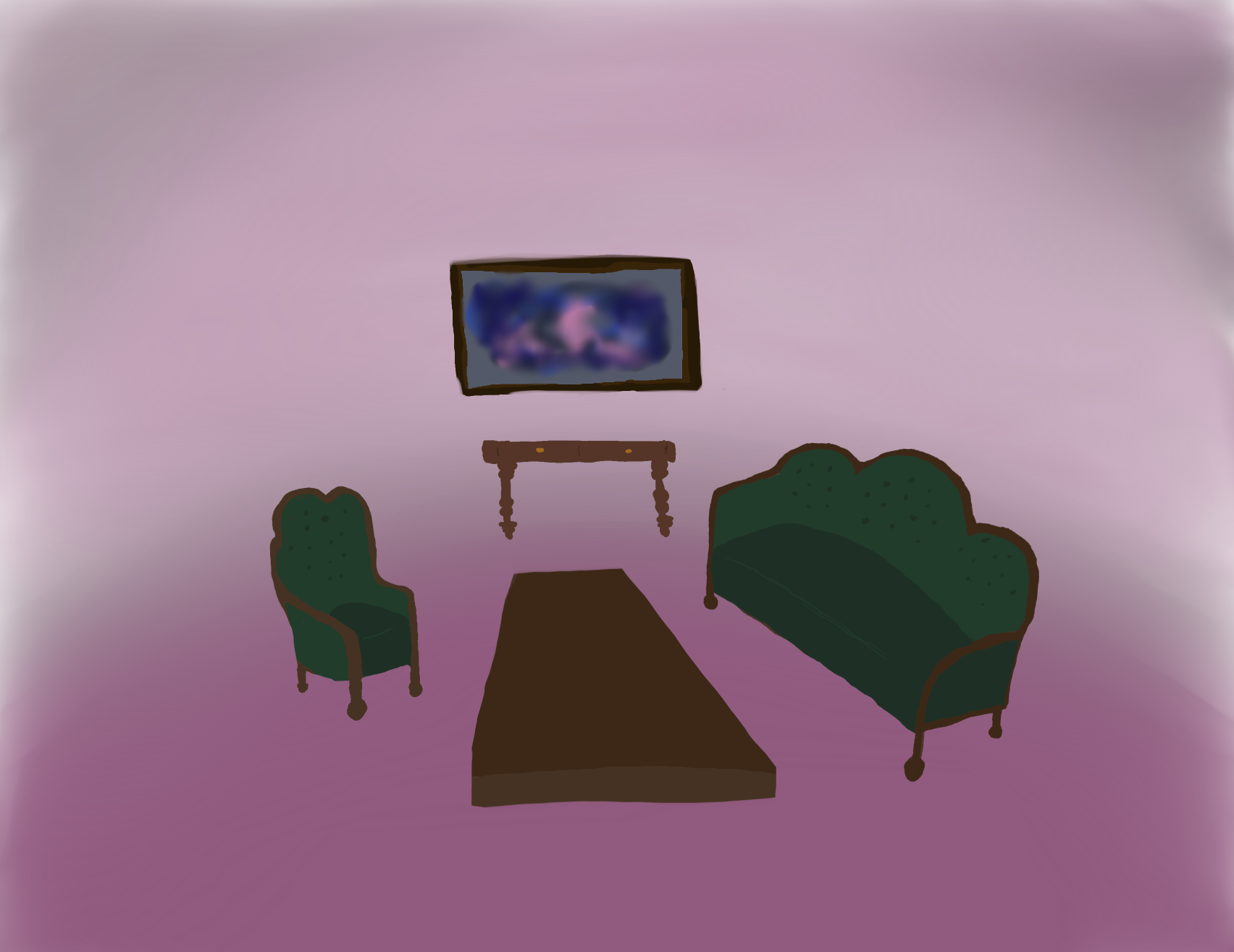 We (my system plus my therapist) think that I might be able to open the doors eventually during the therapy process at some point. We don’t know if it’s a room behind the doors or if it’s a door to another space, like a hall or something. We’ll find out eventually - I’m sure all my memories and trauma are probably stored away behind those doors.
We (my system plus my therapist) think that I might be able to open the doors eventually during the therapy process at some point. We don’t know if it’s a room behind the doors or if it’s a door to another space, like a hall or something. We’ll find out eventually - I’m sure all my memories and trauma are probably stored away behind those doors.
What does it feel like to be a different age than your other alters? Do you or your alters feel distressed when their age is different from their physical age?
It’s frustrating! Sometimes when I’m with friends who are my age, an older alter may come out and be in the front seat and I may be in the backseat/co-conscious. That older alter is more mature and it makes me feel like I’m being rude to others or looking down on them or treating them like kids and i’m some parent. I don’t like it. Sometimes, an alter who is a child may be in the front - That is super frustrating because my child alter does not know how to cook - so if I’m hungry, I need someone else to cook for me or get me food. That child alter likes to play and jump and scream and run a lot and make lots of silly noises - which can be quite annoying to others. It’s the type of behavior you would expect from some toddler or elementary school child, not an adult. People expecting an adult may get upset with that alter because they don’t realize it’s a child - so it’s easy to make us cry . I think a majority of the alters who are not close to age with the physical body or identify as a different gender have issues with our appearance and try to avoid mirrors as much as possible - because otherwise, they don’t recognize themselves/ are not happy with that appearance.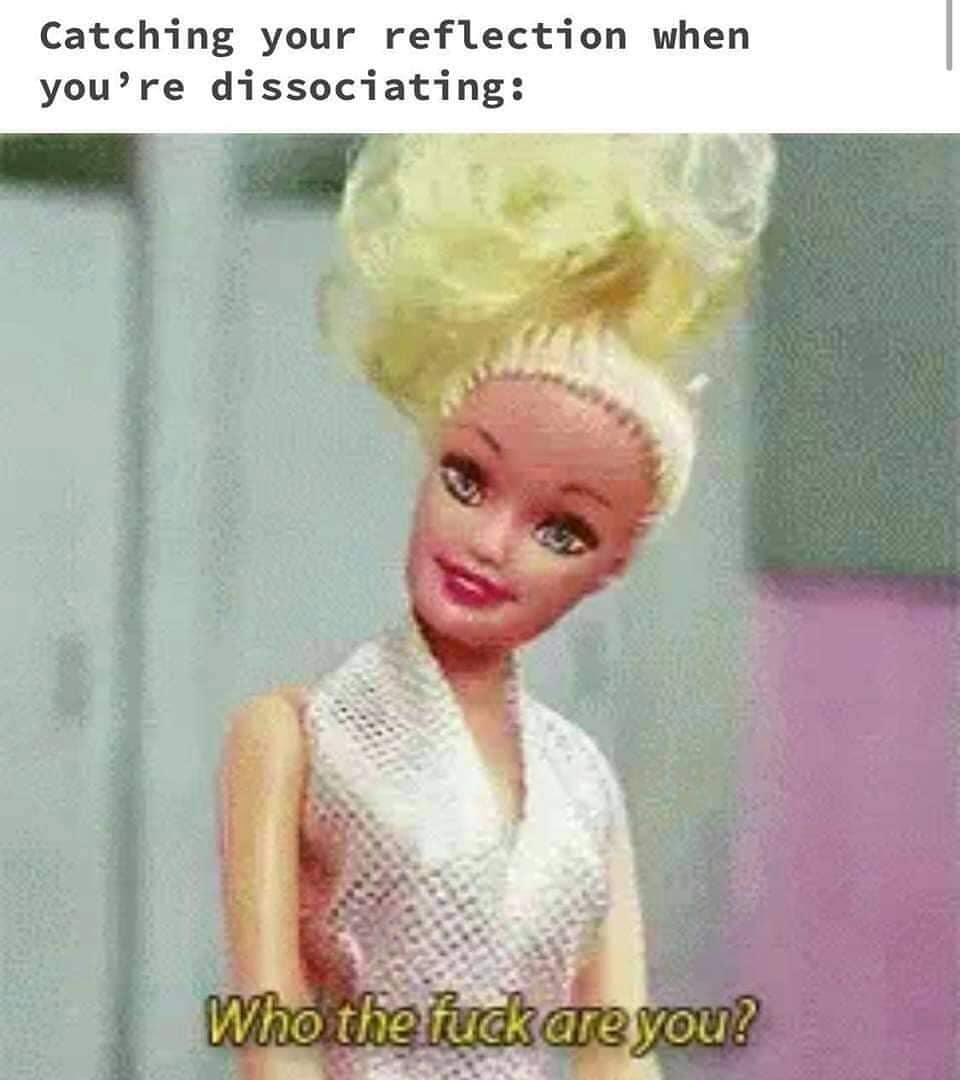 At some point above you mentioned, "I may be in the backseat/co-conscious" . What’s it like to be in the backseat? Does it feel like you’re not able to control what’s happening? Are you able to communicate with them?
It feels like straight up backseat gaming. Like someone else is playing the game but they are not doing what I want them to do - but I don’t have the controller so all I can do is comment or react. The game won’t react because it only reacts to the player’s input.
Sometimes the player will listen to me and take what I said into consideration, or reply to me. And sometimes, the player completely ignores me and pretends I’m not there.
I hope that makes sense.
At some point above you mentioned, "I may be in the backseat/co-conscious" . What’s it like to be in the backseat? Does it feel like you’re not able to control what’s happening? Are you able to communicate with them?
It feels like straight up backseat gaming. Like someone else is playing the game but they are not doing what I want them to do - but I don’t have the controller so all I can do is comment or react. The game won’t react because it only reacts to the player’s input.
Sometimes the player will listen to me and take what I said into consideration, or reply to me. And sometimes, the player completely ignores me and pretends I’m not there.
I hope that makes sense.
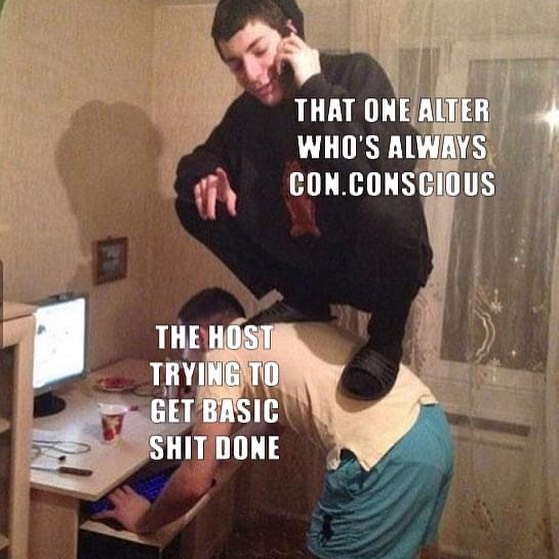
To learn more HTML/CSS, check out these tutorials!
